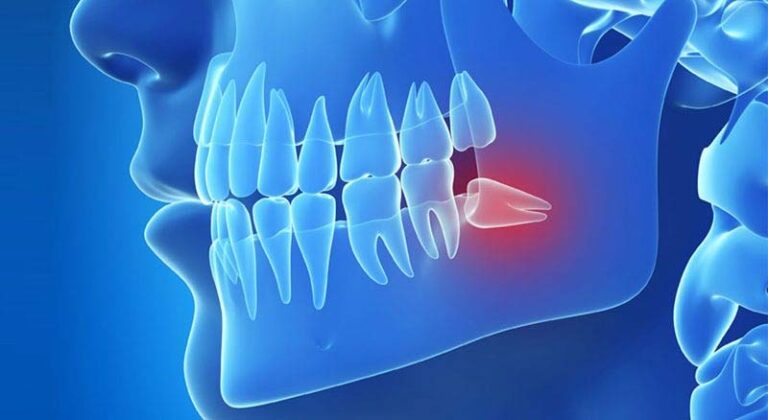Wisdom teeth, also known as third molars, typically emerge between the ages of 17 and 25 and are often a significant topic among young adults. There are many questions surrounding whether or not these teeth should be removed. So, is it really necessary for everyone to have their wisdom teeth extracted? In this article, we’ll comprehensively discuss the anatomy of wisdom teeth, the factors that influence the decision for extraction, and the process details based on our treatment experience at Dent Evka clinic in Bornova, İzmir, led by Dt. Emre Sarkın and Dt. Özlem Gülbenli Yılmaz.
What Are Wisdom Teeth and Why Are They Important?
Wisdom teeth are the third molars located at the back of the jaw and are the last to emerge in the mouth. Due to genetic and environmental factors, the timing, position, and space these teeth occupy can vary from person to person. If the jaw structure is insufficient or the teeth are misaligned, wisdom teeth may remain impacted or erupt in the wrong position, pressing against neighboring teeth.
From a dental perspective, the condition of these teeth can be critical. Misaligned or impacted wisdom teeth may lead to issues such as pain, infection, gum inflammation, jaw structure problems, and damage to adjacent teeth. Therefore, monitoring and timely intervention are important.
Common Problems Caused by Wisdom Teeth
Some of the main issues caused by wisdom teeth include:
-
Impacted Teeth: Teeth that don’t fully erupt and remain under the gums, increasing the risk of infection or cysts.
-
Crowding and Lack of Space: Wisdom teeth can cause misalignment by putting pressure on adjacent teeth, which is especially important during orthodontic treatment.
-
Pain and Swelling: Gum infections (pericoronitis) can lead to discomfort and swelling.
-
Tooth Decay: Due to their location, wisdom teeth are harder to clean and more prone to decay.
-
Jaw Joint Problems: Long-term issues can lead to jaw pain and limited movement.
At Dent Evka, we thoroughly evaluate all these issues.
Factors Influencing the Decision to Extract Wisdom Teeth
The decision to remove wisdom teeth must be assessed individually. The general criteria include:
-
Eruption Status: Fully erupted, partially erupted, or impacted.
-
Tooth Position and Alignment: Properly aligned or misaligned.
-
Pain and Infection: Patient’s symptoms and clinical examination results.
-
Health of Surrounding Tissues: Damage or infection in neighboring teeth or jawbone.
-
Overall Health Status: Especially immune system and general health conditions.
-
Orthodontic Planning: The role of wisdom teeth in treatment planning.
This decision process is supported by modern dental techniques and radiographic imaging. At Dent Evka, we perform panoramic X-rays and, when necessary, tomography scans to provide a comprehensive evaluation.
How Is Wisdom Tooth Extraction Performed? Procedure Steps
Wisdom tooth extraction is generally performed comfortably under local anesthesia. Depending on the eruption status, the procedure may be simple or surgical.
-
Simple Extraction: Applied to fully erupted and easily accessible teeth.
-
Surgical Extraction: For impacted or partially impacted teeth, the gum is opened and the tooth may be removed in sections.
All surgical procedures at Dent Evka are carried out using sterile, state-of-the-art equipment. Patients are informed before the procedure, and necessary precautions are taken.
Post-Extraction Care and Healing Process
The healing process varies depending on the patient’s overall health and care. At Dent Evka, we advise our patients on the following aftercare:
-
Apply gauze to reduce bleeding for the first 24–48 hours.
-
Avoid habits like smoking or alcohol that delay healing.
-
Take prescribed painkillers and antibiotics as instructed.
-
Maintain oral hygiene without disturbing the extraction site.
-
Consume soft and lukewarm foods.
It is also essential to attend post-op check-ups to detect any complications early.
Who Should Have Wisdom Teeth Removed and Who Can Wait?
A dentist’s thorough examination is essential before deciding on extraction. Extraction is more commonly recommended in the following cases:
-
Recurring pain and infection
-
Pressure or damage to neighboring teeth
-
Impact on orthodontic treatment due to misalignment
-
Gum disease or tooth decay
If the tooth has erupted properly, is pain-free, and surrounding tissues are healthy, it can be monitored under regular check-ups and extraction may be postponed.
The Dent Evka Difference in Wisdom Tooth Extraction in İzmir
Located in Bornova, İzmir, Dent Evka stands out with its specialized services in wisdom tooth extraction. Under the leadership of Dt. Emre Sarkın and Dt. Özlem Gülbenli Yılmaz, our clinic offers patient-specific treatment plans and reliable solutions using advanced technology.
Dent Evka not only focuses on extractions but also provides comprehensive consultation to help maintain oral health and hygiene after the procedure, ensuring a healthy and comfortable mouth structure post-extraction.
Wisdom Tooth Extraction Should Be Based on Expert Evaluation
Whether or not wisdom teeth should be extracted depends on the individual’s oral structure, overall health, and tooth position. Not everyone needs to have them removed. That’s why it’s important to make the decision through a detailed evaluation by a professional dentist using the proper diagnostic tools.
With its innovative and patient-centered approach, Dent Evka is one of the most trusted clinics for wisdom tooth extraction in İzmir. For a healthy oral structure and peace of mind, feel free to get in touch with us.

